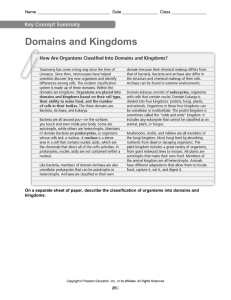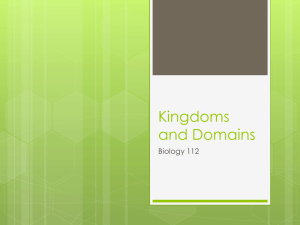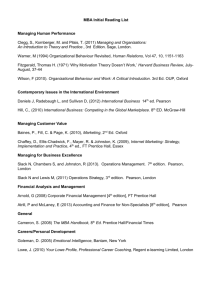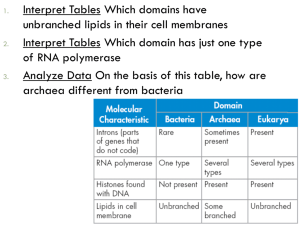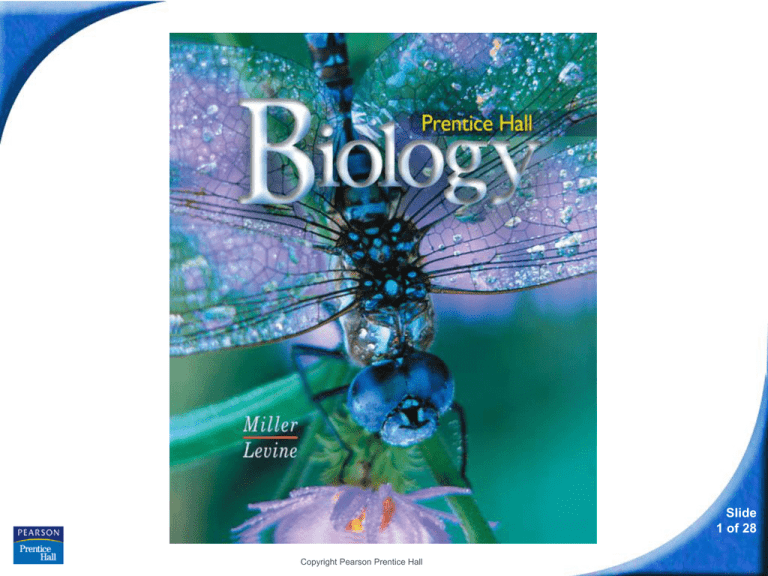
Biology
Slide
1 of 28
Copyright Pearson Prentice Hall
18-3 Kingdoms and Domains
Slide
2 of 28
Copyright Pearson Prentice Hall
18-3 Kingdoms and Domains
The Tree of Life Evolves
What are the six kingdoms of life as they
are now identified?
Slide
3 of 28
Copyright Pearson Prentice Hall
18-3 Kingdoms and Domains
The Tree of Life Evolves
The six-kingdom system of classification
includes:
• Eubacteria
• Archaebacteria
• Protista
• Fungi
• Plantae
• Animalia
Slide
4 of 28
Copyright Pearson Prentice Hall
18-3 Kingdoms and Domains
The Three-Domain System
The Three-Domain System
Molecular analyses have given rise to a new
taxonomic category that is now recognized by
many scientists.
The domain is a more inclusive category than any
other—larger than a kingdom.
Slide
5 of 28
Copyright Pearson Prentice Hall
18-3 Kingdoms and Domains
The Three-Domain System
The three domains are:
• Eukarya, which is composed of protists,
fungi, plants, and animals.
• Bacteria, which corresponds to the
kingdom Eubacteria.
• Archaea, which corresponds to the
kingdom Archaebacteria.
Slide
6 of 28
Copyright Pearson Prentice Hall
18-3 Kingdoms and Domains
Domain Bacteria
Domain Bacteria
a. unicellular prokaryotes.
b. thick, rigid cell walls that surround a cell
membrane.
c. Their cell walls contain peptidoglycan.
Slide
7 of 28
Copyright Pearson Prentice Hall
18-3 Kingdoms and Domains
Domain Bacteria
The domain Bacteria
corresponds to the
kingdom
Eubacteria.
Slide
8 of 28
Copyright Pearson Prentice Hall
18-3 Kingdoms and Domains
Domain Archaea
Domain Archaea
a. unicellular prokaryotes.
b. live in extreme environments.
c. cell walls lack peptidoglycan
d. cell membranes contain unusual lipids not found
in any other organism.
Slide
9 of 28
Copyright Pearson Prentice Hall
18-3 Kingdoms and Domains
Domain Archaea
The domain
Archaea
corresponds to
the kingdom
Archaebacteria.
Slide
10 of 28
Copyright Pearson Prentice Hall
18-3 Kingdoms and Domains
Domain Eukarya
Domain Eukarya
The domain Eukarya consists of organisms that
have a nucleus.
This domain is organized into four kingdoms:
• Protista
• Fungi
• Plantae
• Animalia
Slide
11 of 28
Copyright Pearson Prentice Hall
18-3 Kingdoms and Domains
Domain Eukarya
Protista
Protista
a. eukaryotic
b. Uni or multicellular
c. Heterotrophs or autotrophs
.
Slide
12 of 28
Copyright Pearson Prentice Hall
18-3 Kingdoms and Domains
Domain Eukarya
Fungi
a.heterotrophs.
b.feed on dead or decaying organic matter by
secreting digestive enzymes into it and absorbing
small food molecules into their bodies.
c. multicellular (mushrooms) or unicellular (yeasts).
d. Cell walls of chitin
e. Made up of thin filaments of hyphae into a mass
called mycelium.
Slide
13 of 28
Copyright Pearson Prentice Hall
18-3 Kingdoms and Domains
Domain Eukarya
Plantae
a.Multicellular
b. autotrophic and photosynthetic
c. cell walls of cellulose
d. moss, fern, cone and flowering plants
e. chloroplast (defining organelle)
Slide
14 of 28
Copyright Pearson Prentice Hall
18-3 Kingdoms and Domains
Domain Eukarya
Animalia
a. Multicellular
b. heterotrophic.
c. No cell walls
d. Essential functions: feeding, respiration,
circulation, excretion, response, movement,
reproduction
Slide
15 of 28
Copyright Pearson Prentice Hall
18-3
Click to Launch:
Continue to:
- or -
Slide
16 of 28
Copyright Pearson Prentice Hall
18-3
Organisms whose cell walls contain
peptidoglycan belong in the kingdom
a. Fungi.
b. Eubacteria.
c. Plantae.
d. Archaebacteria.
Slide
17 of 28
Copyright Pearson Prentice Hall
18-3
Multicellular organisms with no cell walls or
chloroplasts are members of the kingdom
a. Animalia.
b. Protista.
c. Plantae.
d. Fungi.
Slide
18 of 28
Copyright Pearson Prentice Hall
18-3
Organisms that have cell walls containing
cellulose are found in
a. Eubacteria and Plantae.
b. Fungi and Plantae.
c. Plantae and Protista.
d. Plantae only.
Slide
19 of 28
Copyright Pearson Prentice Hall
18-3
Molecular analyses have given rise to a new
taxonomic classification that includes
a. three domains.
b. seven kingdoms.
c. two domains.
d. five kingdoms.
Slide
20 of 28
Copyright Pearson Prentice Hall
18-3
Which of the following contain more than one
kingdom?
a. only Archaea
b. only Bacteria
c. only Eukarya
d. both Eukarya and Archaea
Slide
21 of 28
Copyright Pearson Prentice Hall
END OF SECTION

